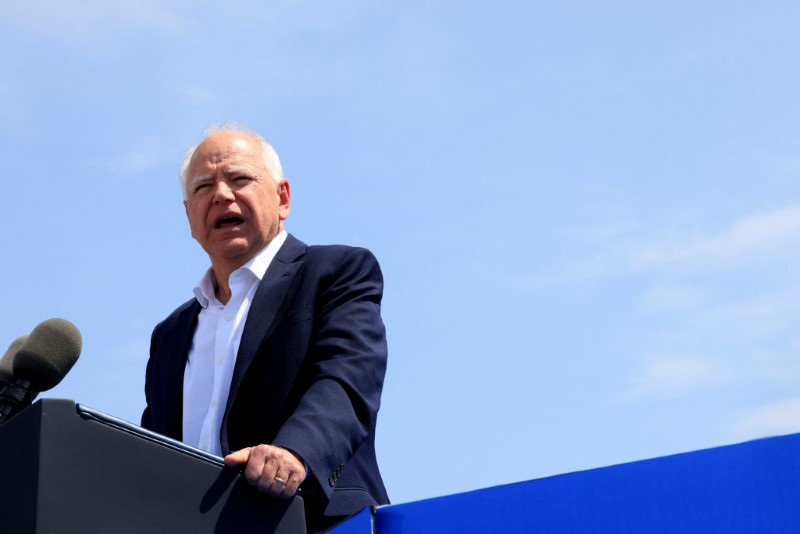By Andrea Shalal, Heather Timmons
WASHINGTON (Reuters) -Vice President Kamala Harris' choice of Minnesota Governor Tim Walz as running mate in the Nov. 5 U.S. presidential election puts "progressive economics" center-stage in the race for the White House.
Walz, a 60-year-old former high school teacher, is a self-proclaimed champion of "progressive values" who, as governor, made school meals free, set goals to cut greenhouse gases, expanded paid leave and protected collective bargaining and overtime.
Conservatives say Harris has revealed her leftist agenda.
WHAT IS A PROGRESSIVE ANYWAY?
Progressivism, much like European social democracy, says companies need strong government oversight to prevent them exploiting workers and the environment; that free-market capitalism is not self-correcting; and that some groups need government protection.
"Progressive economics looks at the world and says: markets are incredibly valuable and powerful, but require public intervention to make them work," said Michael Linden, senior fellow at the Washington Center for Equitable Growth, a former budget official under President Joe Biden.
It contrasts with the "trickle-down economics" favored by Republicans and some Democrats: the notion that tax breaks and policies that favor corporations and rich individuals will boost spending and job creation, ultimately helping everyone.
Walz urged Democrats to embrace progressive values in a call supporting Harris, seeking to redeem the tag of 'socialist', which can have strong negative associations in the U.S. "One person's socialism is another person's neighborliness," he said.
WHAT DO CRITICS SAY?
Critics say government assistance programs and union membership undermine the work ethic, kill innovation and hamper output, ultimately slowing economic growth.
Michael Strain, director of economic policy studies at the American Enterprise Institute, said progressive policies can be inflationary. For instance, he said, government mandates for universal pre-Kindergarten care would raise prices for services while not necessarily increasing provision, given labor shortages.
Concerns about a weakening economy, high debt levels and inflation are not limited to Republicans.
Both Senator Joe Manchin, a Democrat who registered as independent this year and represents heavily-Republican West Virginia, and Senator Kyrsten Sinema, who switched from Democrat to independent in 2023, blocked Biden's push to expand child tax credit.
The National Bureau on Economic Research, asked to assess those concerns, found a temporary child tax credit during the pandemic "had no meaningful impact on employment and labor force participation after six months of benefit distribution."
Recent Supreme Court challenges to reforms enacted by the Federal Trade Commission (FTC), including a ban on "non-compete clauses", show how hard it is to advance progressive policies, said Heidi Shierholz, who runs the left-leaning Economic Policy Institute:
"It feels like it's a heyday for progressive economics in terms of the public discourse, but there are so many obstacles in the path of actually seeing the realization."
HOW HAVE DEMOCRATS CHANGED?
Progressivism formed the basis of Democratic president Franklin Delano Roosevelt's New Deal of the 1930s before being sidelined from the 1980s.
The bank-driven fiscal crisis beginning in 2008 renewed interest, and the idea got a boost when the "Squad" of progressive candidates was elected to Congress in 2018, and again when senators Elizabeth Warren and Bernie Sanders sought the Democratic presidential nomination in 2020.
Biden, traditionally seen as a centrist, surprised many by stacking his economic brain trust with progressive advisers. For much of his career, he had backed pro-corporate policies as a senator from Delaware, a corporate haven.
WHAT WILL HARRIS' PROGRESSIVE POLICIES LOOK LIKE?
Harris and Walz are expected to push "pragmatic progressivism," which Democrats describe as a way to solve local problems faced by families.
Harris has yet to present a complete platform but has renewed some of Biden's promises, including battling price gouging, making the expanded child tax credit permanent, and expanding access to child care.
In Minnesota, Walz enacted free meals for all students regardless of income, and paid-for family and medical leave. But unless Democrats take control of Congress, passing any of these ideas into law will be tough.
HARRIS AND INDUSTRY
Influential industry leaders and wealthy individuals are sure to oppose progressive policies.
Despite going after "corporate greed" and pushing for tougher regulation, Biden and Harris have won support from anti-Trump billionaires such as Reid Hoffman, co-founder of LinkedIn; Seth Klarman, who runs the Baupost hedge fund; John Pritzker, whose family founded Hyatt hotels; and Barry Diller, chairman of Expedia (NASDAQ:EXPE).
However, Reid and Diller have asked Harris to replace FTC head Lina Khan if she wins in November, after Khan attacked corporate monopolies and price-gouging and sought to limit the power of Amazon (NASDAQ:AMZN), arguing they undermine U.S. families and workers.
WHAT DOES MINNESOTA SHOW?
Shierholz said Walz had overseen the strongest warehouse worker and refinery worker safety laws in the U.S., improved nursing home standards, and expanded bargaining rights for university employees, among other things.
Yet Minnesota ranks only 29th for growth among the 50 U.S. states; growth in nonfarm payrolls has been less than 1% since Walz took office in 2019, far below the 5.8% national average.

On the positive side, unemployment during the COVID crisis was well below the national peak and incomes have grown 30% since Walz took office in 2019 through the first quarter of 2024. Inflation also eased notably faster in the state's largest metropolitan area than in the rest of the country, hitting 2.6% in May versus 3.3% nationally.
Walz also signed a substantial tax cut for individuals and companies, contributing to CNBC ranking Minnesota the sixth best state for business.